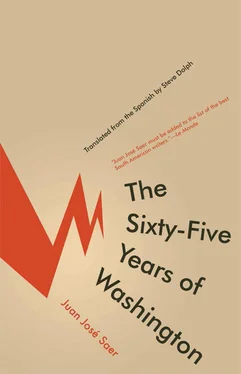Juan José Saer - The Sixty-Five Years of Washington
Здесь есть возможность читать онлайн «Juan José Saer - The Sixty-Five Years of Washington» весь текст электронной книги совершенно бесплатно (целиком полную версию без сокращений). В некоторых случаях можно слушать аудио, скачать через торрент в формате fb2 и присутствует краткое содержание. Год выпуска: 2010, Издательство: Open Letter, Жанр: Современная проза, на английском языке. Описание произведения, (предисловие) а так же отзывы посетителей доступны на портале библиотеки ЛибКат.
- Название:The Sixty-Five Years of Washington
- Автор:
- Издательство:Open Letter
- Жанр:
- Год:2010
- ISBN:нет данных
- Рейтинг книги:3 / 5. Голосов: 1
-
Избранное:Добавить в избранное
- Отзывы:
-
Ваша оценка:
- 60
- 1
- 2
- 3
- 4
- 5
The Sixty-Five Years of Washington: краткое содержание, описание и аннотация
Предлагаем к чтению аннотацию, описание, краткое содержание или предисловие (зависит от того, что написал сам автор книги «The Sixty-Five Years of Washington»). Если вы не нашли необходимую информацию о книге — напишите в комментариях, мы постараемся отыскать её.
The Sixty-Five Years of Washington — читать онлайн бесплатно полную книгу (весь текст) целиком
Ниже представлен текст книги, разбитый по страницам. Система сохранения места последней прочитанной страницы, позволяет с удобством читать онлайн бесплатно книгу «The Sixty-Five Years of Washington», без необходимости каждый раз заново искать на чём Вы остановились. Поставьте закладку, и сможете в любой момент перейти на страницу, на которой закончили чтение.
Интервал:
Закладка:
But Héctor isn’t easily intimidated: smart, occasionally pedantic, with prize-winning paintings in San Pablo and Venice and five or six hanging in the international avant-garde sections of European museums, always with the vague suspicion, most often suppressed around other people, that everything occurring in his absence forms or could form part of a vast conspiracy against his person. According to El Gato, the possibility of a dialectical contest with Washington is particularly exciting to him, a mania that, out of delicacy, Washington pretends not to notice, which, since it provokes Héctor even more, actually generates the opposite of the desired effect. Cohen describes him as ambivalent and, in reference to him, once employed the following jest: He’d like them to like him and no one else like him, but not like liking anyone but him; he likes those who like him to not like each other; it’s not unlike him to not like it when those he likes like him, and to not like that he likes them; he’d like to stop liking people’s liking and make people not like him . But he, the Mathematician, in spite of everything, recognizes Héctor’s genuine interest not only for the quadrivium (arithmetic, geometry, astronomy, music) but for the trivium (grammar, logic, rhetoric), with which he means, Leto assumes, that Héctor, aside from his talent for painting, is not undeserving of invitation to any circle that’s discussing certain universal questions, however small.
Leto nods, his expression more or less abstracted, to show that he has understood not only that Héctor is well-versed in certain questions but also — and especially — what those questions are. But the Mathematician doesn’t even see him, occupied as he is in specifying and organizing the details of the memories he obtained, through Botón, the previous Saturday, on the bench at the stern, on the upper deck of the ferry, and which will accompany him the rest of his life. You could say the memories parasitize other experiences, but they don’t, for this reason, lose force, sense, or cohesion. In fact most of the details are familiar and, because of this, it’s not difficult for him to piece them together, in contrast to Leto who, new to the city, or relatively new at least, has to patch them up — with assorted memories that are unconnected to the objects being evoked or with vague images that aren’t traceable to any experience related to the events — alongside the fragmentary, scattered, and sometimes confused image the story produces in him and which, paradoxically, because of its fragmentation and hypothetical nature, just like a fairy tale, leaves profound and vivid traces in his memory: Basso’s ranch, Silvia Cohen, smarter than her husband, the table under the pavilion, the conversation, Beatriz rolling a cigarette, the ferry to Paraná, Washington’s ironic silences, Pirulo’s wife bleeding herself with the syringe, Washington’s three mosquitos, tiny and gray, swirling around the summer night, buzzing clearly, in the illuminated studio in Rincón Norte, Noca’s horse stumbling in a field along a coastline partly made up of coastlines previously visited and transferred to the above — all of that, no? — also mixed, but not carefully measured, with the contradictory assertions made by Tomatis and the Mathematician, who continues, clear and distilled, as they say: Until Washington gives in and says —Washington, no? — no, I was saying that last summer , etc., etc., to Héctor, whose attentive but somewhat severe, hostile silence and pre-emptive expression more or less signify: Yes, yes, I’m listening, but in any case, say what you will, I already have a refutation prepared . Washington’s expression, meanwhile — a singular masterpiece of highly controlled art that in no way betrays an awareness of Héctor’s threatening severity — Washington’s expression, I was saying, along with his words and the intonation used to pronounce them, compose something that, in what they call an organized or discursive form could be formulated more or less like this: I don’t know what the others have led you to believe, but if I were you I’d ignore them. Don’t waste time on my meandering trivia, there’s nothing to refute. Everyone here is a little overexcited by the alcohol and the party. No one can hold them back. I’m an old man — sixty-five Aprils today exactly — living in Rincón Norte, retired, occupied exclusively with his little cottage. Watching that my chicory doesn’t go to seed and watering a lot during the hot months doesn’t leave me time for much else. Our friends here exaggerate, don’t believe them. As you seem even at a distance to be an intelligent man, you can’t help but see how scatterbrained they are. But since you are so kind as to let me take up your time and insist on the pleasure of hearing me prattle, I’ll tell you that last summer, after dinner, I sat down to read something, I don’t remember what, Mitre’s Rimas, maybe, or a novel by Cambaceres, when out of the silence appeared three mosquitos that started buzzing and swirling around me, until eventually they distracted me from my reading. And that’s it. As you can see, our friends here get worked up when they drink . Héctor, according to the Mathematician, and always according to Botón, aware of having been stalled by Washington’s rhetorical tricks, which, fundamentally, he is forced to recognize as effective, because by avoiding any affirmative discourse, as it has been called, Washington has compelled him to renew his request for information, disarming his killer refutation — Héctor, we were saying, or rather yours truly was saying, feigning a disinterested curiosity over certain fragmentary reports he would prefer not to amplify, specifically because of the limited faith owed to their friends in their current state, to which Washington does not seem to have succumbed, he starts over: But hadn’t they said something about Noca, the fisherman? Had he misheard or had they mentioned Noca’s horse? Hadn’t there been some talk during dinner over whether horses can or cannot stumble, and hadn’t this been the actual reason why Washington had brought up the mosquitos? Washington spends a considerable length of time trying to remove a tobacco strand from his lower lip, with particularly inept fingers, after having listened to Héctor’s questions with complete attention while — according to the Mathematician, and according to the Mathematician always according to Botón — looking fleetingly into Héctor’s eyes and then fixing his gaze on the dark patio beyond the pavilion, the dark patio now beginning to chill in the morning air, then responding slowly, and if his words can be summarized, and because in any event a summary is always required, they might be summarized like this: That’s right, that’s right, I don’t deny it: our friend Noca said something about his horse. He said that if he was late with the fish it was because his horse had stumbled that afternoon along the coast, as per my eminently unverifiable assertion. Noca, who is of my same generation, like me isn’t a top seed. And when our friends Cohen and Barco started discussing whether or not a horse could stumble I offered my modest reticence — it’s not that I wanted to deny the stumbling of horses, it wasn’t anything like that. Noca just happens to be a walking threat to the principle of sufficient reason, and if you want to discuss something it’s better to ignore his assertions. That’s why, with utmost caution and not intending to draw any conclusion, I told the story of the three mosquitos. Basso, you’ve got the bottle handy; be a gentleman and pour me a finger of whiskey? Thank you . And according to the Mathematician, without saying another word Washington started sipping his drink and, fixing an extremely deferential look on Beatriz, who was watching him with a furrowed brow and a kind of malevolent smile, said: Did you know, Beatriz, that velvet dress looks very pretty on you? Thank you, Washington , says the Mathematician that Botón said that Beatriz responded, suggesting that she followed his meaning, but with a somewhat exaggerated intonation meant to show that she was aware of his evasive maneuvers.
Читать дальшеИнтервал:
Закладка:
Похожие книги на «The Sixty-Five Years of Washington»
Представляем Вашему вниманию похожие книги на «The Sixty-Five Years of Washington» списком для выбора. Мы отобрали схожую по названию и смыслу литературу в надежде предоставить читателям больше вариантов отыскать новые, интересные, ещё непрочитанные произведения.
Обсуждение, отзывы о книге «The Sixty-Five Years of Washington» и просто собственные мнения читателей. Оставьте ваши комментарии, напишите, что Вы думаете о произведении, его смысле или главных героях. Укажите что конкретно понравилось, а что нет, и почему Вы так считаете.












